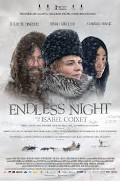
Directed by
Isabel Coixet
104 minutes
Rated M
Reviewed by
Bernard Hemingway

Endless Night
Synopsis: In 1908 Josephine Peary (Juliette Binoche) trekked to the Arctic circle to join her husband, polar explorer, Robert Peary. It was a folly that cost innocent lives.
Isabel Coixet's film was so roundly disparaged after its premiere at the Berlin Film Festival in 2015 that it was re-cut and shortened by 20 minutes, a voice-over by Binoche added and, presumably to cover its guilty tracks, its original title, Nobody Wants the Night, was changed to Endless Night. I haven’t seen the original version but this new, leaner edition worked for me. Even more than that, I loved it. Which is a tad disconcerting as much of the criticism would still seem to be applicable.
No doubt there is less of writer Miguel Barros’ screenplay which was widely derided for the purpleness of its moralising prose and the plodding second act has been enlivened but other major criticisms including the casting of Binoche as the American explorer and Japanese actor Rinko Kikuchi as an Inuit, the condescending depiction of the Inuits, the ungainly mixture of feminist revisionism and breast-beating melodrama, along with the underwhelming cinematography of Jean-Claude Larrieu and the over-wrought score by Lucas Vidal, should all still be relevant.
As the saying goes, “I couldn’t agree less”. Presumably as a result of the heavy excising, Gabriel Byrne’s character gets short-shrift as Peary’s Western guide, fatalistically falling victim to his sense of duty and Josephine’s imperious nature after valiantly trying to make her aware of the error of her ways and this does leave us with thwarted expectations but for the rest I found this an impressively ambitious production, with Larrieu’s photography evoking the silently alien vastness of the Arctic North and Vidal’s music resonating with the tragic story of a willful woman’s awakening at great cost to all around her.
No matter whether a film is depicting Depression-era Chicago, 18th century Europe, or a galaxy far, far away the test of a film’s success is whether or not we are convinced by the world it creates. In this respect I found Endless Night compelling. Although its opening titles tell us that its story is based on real events and characters and indeed it uses actual names and real places in the telling, the strength of the interpersonal drama and its elemental setting is enough to make comparisons between fact and fiction effectively beside the point.
Yes, Binoche is an odd-choice to play the Maryland-born Josephine but perhaps Coixet chose the actress for her acting skills rather than historical conformity. Ditto for Kikuchi who some might recognize as the deaf mute Chieko in Babel. With no actual knowledge of Inuit people, I, at lest found her very believable in her syntax-free engagements with her arrogant companion. As for the depiction of the Inuits as exotic simpletons, I took this to be a reflection of Josephine’s Eurocentric inability to understand the Iniut’s culturally-coded deportment towards Westerners rather than a blind spot of the film itself. Its second half in which the two women together spend a winter of permanent night and Josephine gradually comes to realize the hollowness of her beliefs about the world she so confidently assumes is there for her subjugation, is both gripping in its intensity and saddening in its outcome.
Although I do have a fondness of stories of Arctic exploration and physically-demanding productions, this aside, Endless Night is still very much better than the negative press might have you believe.

Want more about this film?


Want something different?




